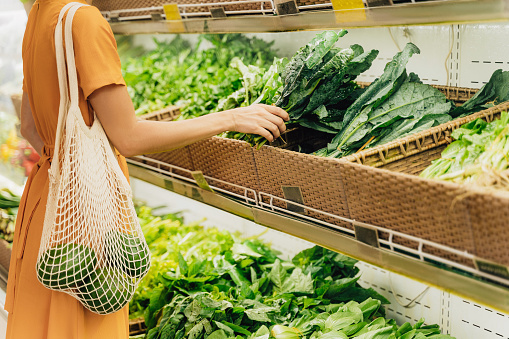No-waste shopping tips

Food shopping is something everybody has to do on a very regular basis. Adjusting your habits and incorporating no-waste into your shopping in a drive to be more sustainable can make small steps towards reducing our impact on the planet.
Here are six handy tips on what you can start doing to make this a reality...
Bring your own bags and containers
We've all been there when you've just got to the shop and realised you're going to need to buy bags that will just go to waste.
Bringing your own reusable plastic or tote bags is an excellent method of reducing plastic waste. Not to mention saving you some money because single-use bags now cost 10p from all shops in England as of May last year. This comes as a slight change from the previous policy that only applied a 5p charge at retailers with 250 employees or more and continues the bid to reduce plastic waste.
Shopping at bulk supermarkets
You can take this further by bringing containers to fill with goods at the shops. Some shops and supermarkets have bulk buying options for certain dry goods such as cereal and pasta. These non-perishable products are great to get in bulk to avoid the unnecessary packaging that comes with smaller, more frequent purchases.
Not only this, but buying in bulk will reduce how often you'll need to go to the shops, helping to lower your environmental impact on the planet with lessened trips in the car.
Opt for package-less or reduced packaging products
A lot of fruit and veg will either come loose or pre-packaged. If you choose to go for the reduced or no packaging options, you'll lower the demand for waste plastics to be manufactured in the future.
Many supermarkets have installed this eco-friendly option in their stores as part of their push to become a more sustainable business, helping shoppers shop in a more environmentally-friendly way.
Eco-friendly options
It's important to consider that more than just the packaging and bags can be eco-friendly. The products also have recyclable or reusable variations, including wrapping paper, straws and more. This also includes buying second hand when it comes to clothes shopping, charity shops are a great way to reduce waste and prevent the need for new clothes to be manufactured.
You could also research and choose non-plastic containing cleaning products such as soaps, laundry detergent and washing up liquid that does not use toxic chemicals and instead have more environmentally friendly ingredients.
Buy products that are reduced
Food waste presents a significant problem because of how much is produced each year. In the UK alone, it's estimated that we throw away around 9.5 million tonnes of food waste per year.
You might think buying reduced goods is simply to save yourself some money on some great last-minute food deals. While this is true, and your wallet will thank you, it's not the only reason to do so, as you're also preventing this food from being thrown away and wasted. If you're worried the food will go off, you can often freeze it to allow it to last longer, making reduced food buying a viable option.
Buy local
Choosing a more local shop takes into consideration the distance the product you are buying has taken to arrive on the shelves. Doing so ensures the goods have been sourced and harvested locally and reduces the pollution created from the drive to the shop.
Hopefully, these tips have shown you that no-waste shopping isn't just about how you buy but also what and where. With alternative reusable solutions, you should now be ready to embrace minimalism and challenge the norm that brings so much waste.